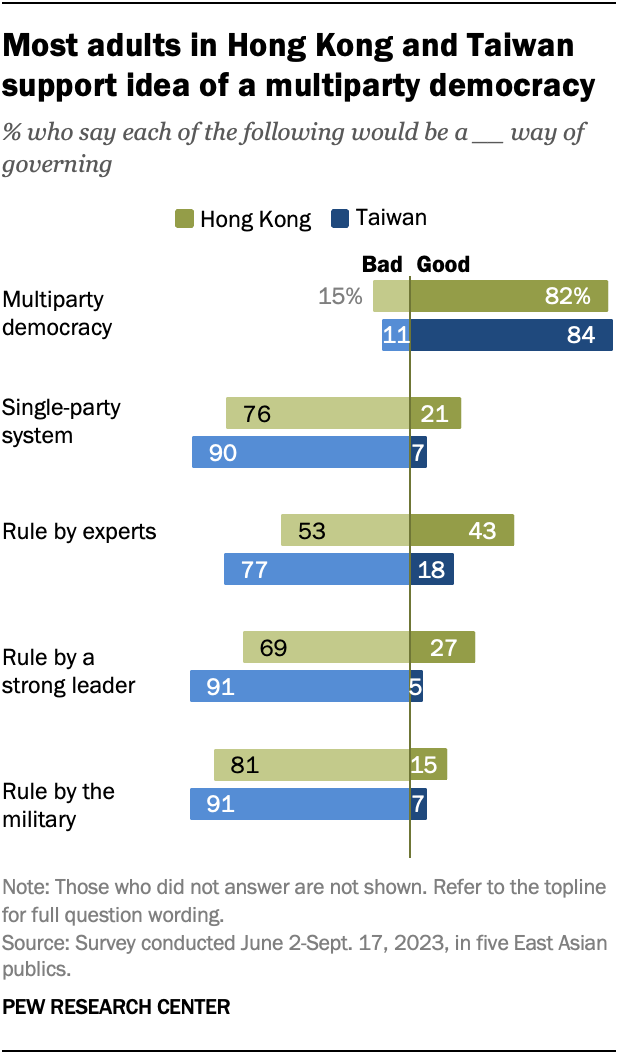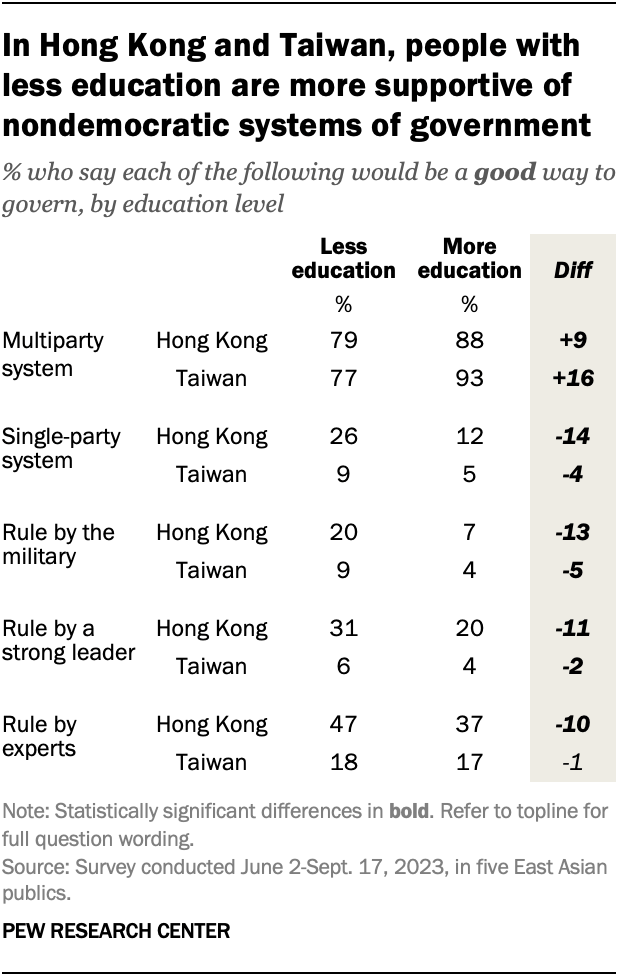More than eight-in-ten adults in Hong Kong and Taiwan say democracy is a good way to govern, according to Pew Research Center surveys conducted in summer 2023. Yet some people in both places are open to alternative systems of government.
The data used in this analysis is part of a larger Pew Research Center project examining religion, spirituality and nonreligion in East Asia. Hong Kong and Taiwan were the only places surveyed that included these questions about different government systems and that were not included in our cross-national Global Attitudes survey. The questions about rule by experts, a strong leader and the military used the same wording across both surveys, though the projects differed in their overall focus and coverage.
This Pew Research Center analysis focuses on public opinion of different political systems in Hong Kong and Taiwan. It also explores how views in these places compare to attitudes from a survey of 24 countries around the world.
Data comes from a survey of 4,289 adults in Hong Kong and Taiwan conducted as part of a broader study of attitudes in Hong Kong, Japan, South Korea, Taiwan and Vietnam. The survey was fielded from June 6 to Sept. 17, 2023. All interviews included in this analysis were conducted over the phone.
This survey is part of the Pew-Templeton Global Religious Futures project, which analyzes religious change and its impact on societies around the world.
Respondents were selected using probability-based sample designs. The data was weighted to account for different probabilities of selection among respondents and to align with demographic benchmarks for adult populations.
Here is the full wording for the questions used in this analysis:
- Multiparty democracy, “A system in which two or more political parties contest elections”
- Single-party system, “A system in which elections are held with only one party participating”
- Rule by a strong leader: “A system in which a strong leader can make decisions without interference from parliament or the courts”
- Rule by experts: “Experts, not elected officials, make decisions according to what they think is best for (survey public)”
- Rule by the military: “The military rules (survey public)”
Here are the questions used for the analysis, along with responses, and the survey methodology.
The Hong Kong survey was fielded before the recent passage of laws giving the government more latitude to punish people for behavior that is considered a threat to national security, including opposing the Chinese or Hong Kong governments.
In Hong Kong, 82% of adults say that a democratic system in which two or more political parties take part in elections would be a good way of governing. A similar share of adults in Taiwan (84%) say the same.
Support for other political systems is less common in both places, though there is some backing for nondemocratic options, as is the case in many other parts of the world.

In Hong Kong, for example, 21% of adults say a good way of governing would be a system in which elections are held with only one party participating. In Taiwan, 7% say this.
Sizable shares in both places have a positive opinion of technocracy – a system in which experts, not elected officials, make decisions according to what they think is best. In Hong Kong, 43% say technocracy would be a good way to govern, while 18% say the same in Taiwan.
When it comes to autocracy, roughly a quarter of adults in Hong Kong (27%) support a system in which a strong leader can make decisions without interference from parliament or the courts. Only 5% in Taiwan feel similarly.
Military rule, meanwhile, is not a popular approach in either place. In Hong Kong, 15% of adults say this would be a good way to govern – a view shared by 7% of adults in Taiwan.
Views differ by education, emotional attachment to China
In Hong Kong and Taiwan, views of political systems tend to vary by education.

People with more education are more likely to support a system where at least two political parties take part in elections. In Taiwan, for instance, 93% of those with more education say that a multiparty democratic system is a good way to govern, compared with 77% of those with less education.
People with less education, in turn, are more likely to support single-party rule, expert rule, autocracy and military rule. In Hong Kong, those with less education are about twice as likely as those with more education (26% vs. 12%) to express support for a system in which only one party participates in elections.
Attitudes in Hong Kong also differ by respondents’ attachment to China.
Hong Kongers with an emotional attachment to China are more likely than those without such an attachment to have a positive view of a one-party system, technocracy, autocracy and military rule. For example, 32% of those with an emotional attachment to China say that rule by a strong leader would be a good way of governing Hong Kong, compared with 18% of those who do not feel particularly attached to China.
In Taiwan, views of different forms of government generally do not differ by emotional attachment to China.
Note: Here are the questions used for the analysis, along with responses, and the survey methodology.

